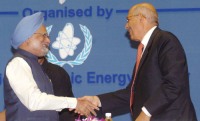India could have 470 GWe of nuclear capacity by 2050 if it thinks big and manages its program correctly, said the country's prime minister, Manmohan Singh.
 |
| Manmohan Singh and Mohamed ElBaradei on stage at the conference |
The event was scheduled for the centerary of the birth of Homi Babha, the pioneer of Indian nuclear energy, and Singh repeated Babha's words to a similar conference in 1955: "For the full industrialization of the under-developed countries, for the continuation of our civilization and its further development, atomic energy is not merely an aid, it is an absolute necessity."
It was Babha that first proposed the three-stage closed nuclear fuel cycle that India still pursues. The first stage is based on pressurized heavy-water reactors using natural uranium and producing plutonium; the second on fast-neutron reactors using plutonium and breeding uranium-233 from thorium; the third sees more heavy-water reactors fuelled by uranium-233.
Singh said, "The vast energy potential of our three-stage program allows us really to think big... If we manage our program well, our three-stage strategy could yield potentially 470,000 MWe of power by the year 2050. This will sharply reduce our dependence on fossil fuels and will be a major contribution to global efforts to combat climate change."
After a US-led initiative to change nuclear trade rules to allow India full access to international markets, the country is set for a building surge of more conventional pressurized and boiling water reactors from overseas vendors. Singh said: "Our nuclear industry is poised for a major expansion and there will be opportunities for the global nuclear industry to participate." The country recently announced a version of its third-stage reactor adapted for export - something that would never have happened before the lifting of trade restrictions.




_66891.jpg)
_30199.jpg)
_72306.jpg)






